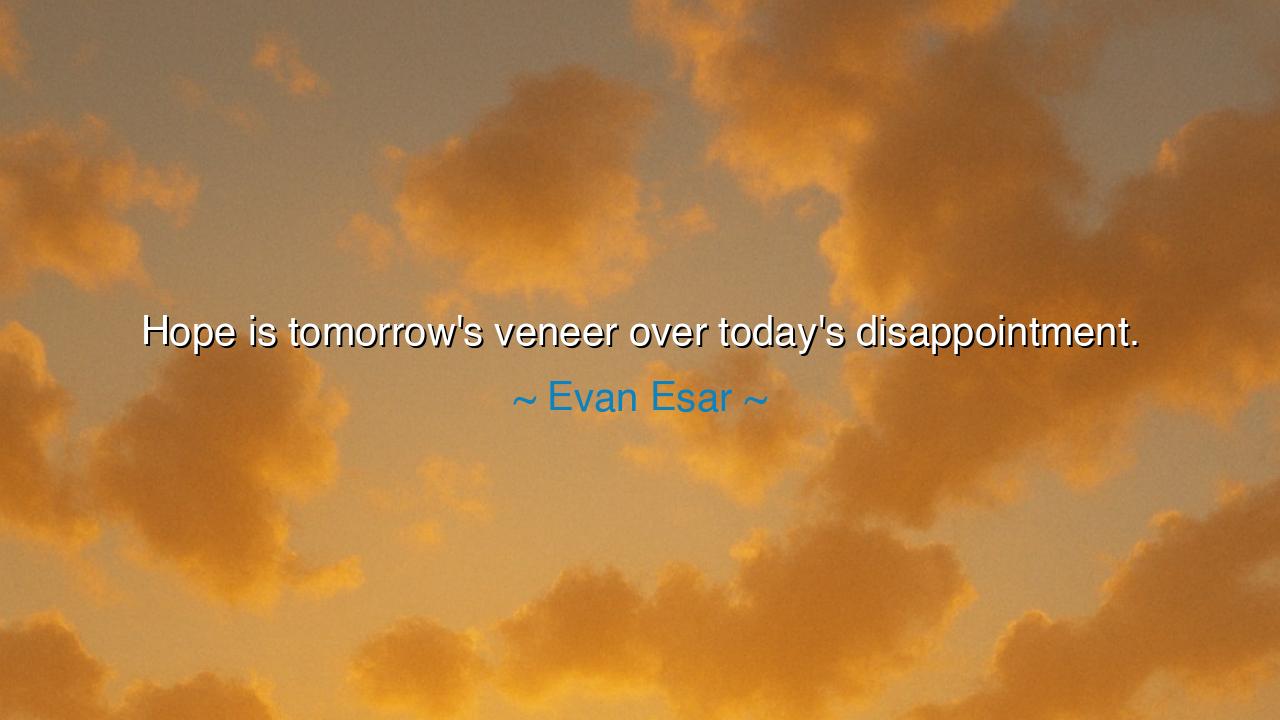
Hope is tomorrow's veneer over today's disappointment.






The words of Evan Esar—“Hope is tomorrow’s veneer over today’s disappointment”—are as delicate as they are profound. In this single line, the humorist and philosopher reveals the duality of the human heart, the way it covers its wounds not with denial, but with hope, that thin yet powerful film that keeps despair from devouring the soul. Esar, known for his wit that often masked deep understanding, here speaks a truth both tender and tragic: that life, in its ceaseless rhythm of gain and loss, forces us to dress each day’s sorrow in the garments of tomorrow’s promise.
To call hope a veneer is not to diminish its value, but to describe its purpose. A veneer is a thin covering—fragile, perhaps, but protective. It does not erase the roughness beneath, but it gives the wounded surface grace enough to endure. So it is with hope. It cannot erase disappointment, yet it can make it bearable. Esar reminds us that human beings survive not because we forget our pain, but because we give it meaning. Every tomorrow becomes a healing gloss we place upon the fractures of today, so that, though the world may crack us, we may still appear whole enough to go on.
In this wisdom echoes the philosophy of the ancients. The Stoics of Greece and Rome knew that sorrow and joy walk hand in hand, and that the art of living lies not in escaping disappointment but in transforming it. The great Marcus Aurelius, emperor and philosopher, faced war, betrayal, and loss, yet wrote in his meditations: “Do not be ashamed of the wounds that time inflicts, for they are the signs of endurance.” Esar’s “veneer” is that same endurance made visible—the courage to move forward even when the heart is cracked with grief. Hope, then, is not illusion; it is the art of survival through imagination.
We see this truth written in the story of Anne Frank, the young girl who hid from the darkness of her time with little more than a diary and her unbroken faith in human goodness. Her life was a tapestry of disappointment—of confinement, fear, and loss—but she continued to write as though the world might yet be redeemed. Each word she penned was a thin veneer of hope laid over unbearable reality. She did not deny the pain, but she refused to let it define her spirit. In her youth, she embodied the eternal law of life itself: that hope must always follow disappointment, as dawn follows the night, fragile yet unrelenting.
Esar’s words also speak to the cycle of renewal that governs all human striving. We hope, we fail, we grieve—and then, miraculously, we hope again. Disappointment is the tax we pay for caring, for daring to expect more from the world. Yet without hope, we would never rise after falling, never build after ruin. Hope may begin as a mere veneer, but with time and courage, it becomes the seed of new beginnings. Every invention, every reform, every act of love begins as a fragile glimmer laid over the disappointment of what once was broken. Thus, the veneer becomes the foundation, and the covering becomes the core.
And yet, Esar’s tone carries the humility of wisdom. He reminds us not to worship hope blindly, for it, too, can deceive. A veneer can shine while the wood beneath decays; so can false hope blind us to the truth of what must change. The wise do not use hope to deny their disappointment, but to transform it into resolve. They polish the rough surface not to pretend it is smooth, but to make it beautiful despite its flaws. Hope, when honest, does not lie about tomorrow—it simply whispers that tomorrow is worth waiting for.
Let this, then, be the lesson handed down to all who live through trial: wear your hope like a veneer, but build your strength beneath it. When disappointment comes—and it will—do not let it strip you bare. Let hope cover the wound until it heals, and let the pain beneath remind you that you are still alive, still striving. Each day, renew your veneer, not as deceit, but as devotion—to life, to growth, to the possibility of joy returning.
For in truth, hope is tomorrow’s veneer over today’s disappointment, and that is no weakness, but humanity’s greatest art. The gods gave us reason to see the world as it is, but they gave us hope to endure it until we can make it what it should be. So, when sorrow weighs heavy upon you, remember this sacred craft: polish your disappointment with hope, until it shines enough to lead you through the night—and in doing so, you will awaken to a dawn of your own design.






AAdministratorAdministrator
Welcome, honored guests. Please leave a comment, we will respond soon